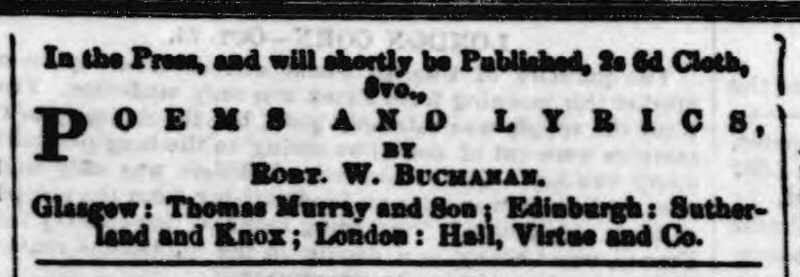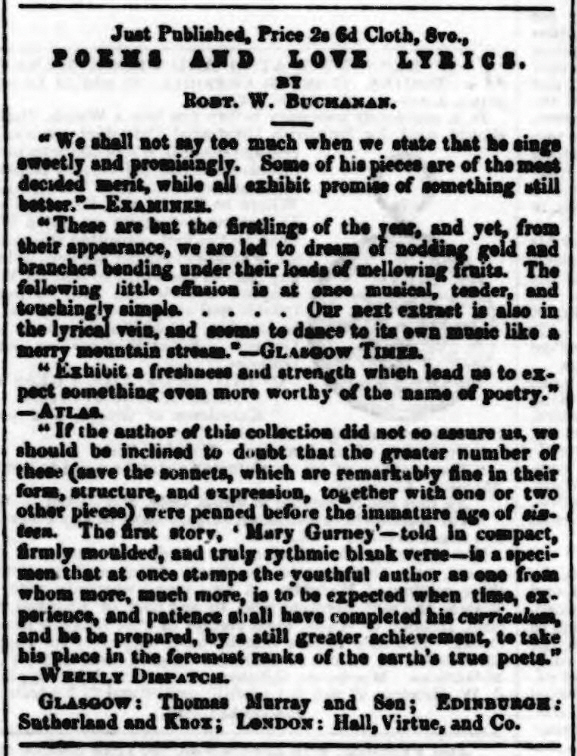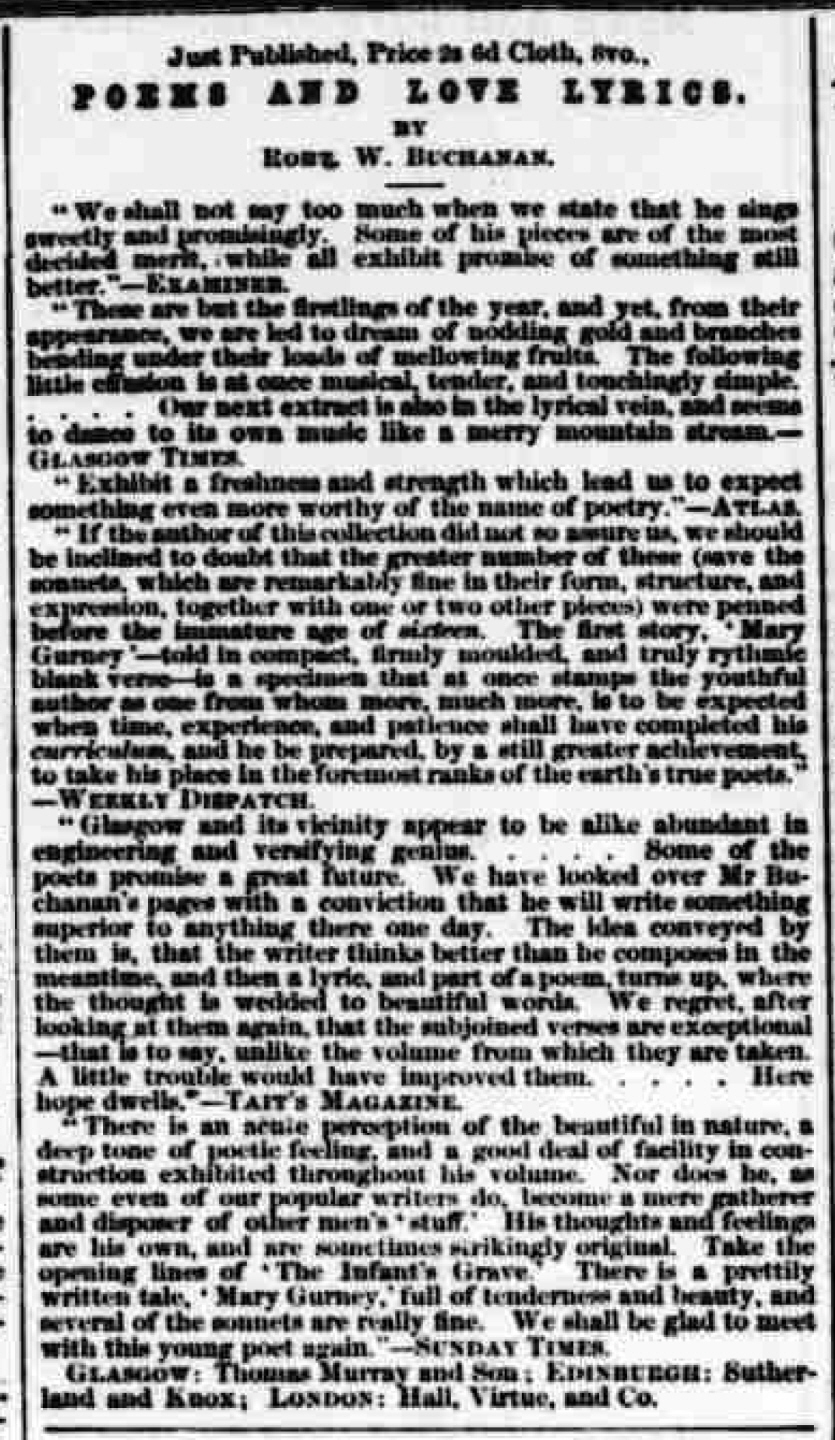ROBERT WILLIAMS BUCHANAN (1841 - 1901)
|
ROBERT WILLIAMS BUCHANAN (1841 - 1901) |
|
|
|
|
|
|
|
|
ROBERT BUCHANAN AND THE GLASGOW SENTINEL - continued
|
 |
|
The Glasgow Sentinel (14 November, 1857 - p.1) Reviews. POEMS AND LYRICS. By ROBERT W. BUCHANAN. Glasgow: Thomas Murray and Son. MODERN society, notwithstanding all its searing influences, is pervaded by an ever-active spirit of poetry. That such is the case, is abundantly evident from the complexion of the stream which, as from an inexhaustible fountain, is ever issuing from the press. Another, and another, and another, streameth forth the grand procession of the books. Now it is a stately and sonorous history—now a hard-featured and crabbed-looking treatise on science; again it is a creation of fiction—mirthful or serious—“holding the mirror up to nature;” and anon, it is an utterance of song, haply in all the pomp of the epic, but far more frequently in the less ambitious shape of lays and lyrics swelling forth from souls which love to pipe a simple song to gladden the hearts of their fellow-men. The number of the minstrel tribe in modern days is indeed great. They are of all ranks and degrees of excellence, from Tennyson, upon whose honoured brow is wreathed the laurel of an assured immortality, down to the most lowly and illiterate metre balladmonger who ever counted his fingers in the vain attempt to make his verses clink. Yet ever as the “gude black prent” comes forth, we love to greet the successive aspirants to poetic honours, and to scan their several offerings to fame. In this way we have often met with good grains among the chaff, and beadings of finest gold where we had only looked for gravel or clay. The latest contribution to the literature of the lyre—at least the latest which has come under out notice—is by the author of the little volume the title of which heads the present article. From the preface—a modestly-written prelude to the poetry—we learn that Mr Buchanan is a very young man, and that the greater number of his productions were penned before he had attained his sixteenth year. On this ground he appeals to the kindlier feelings of the critic, and truly reminds him “that the bark of youth is necessarily more abundant in sail than in ballast.” That the generality of the fault-finding brotherhood will make due allowance for the juvenility of the poet we have no doubt, although there may be a testy old buffer here and there who will growl at the appeal. Such a one, we flatter ourselves, we are not. Remembering that Cowley and Pope both lisped in numbers, we have always scanned the pages of the young poet with interest; not in the expectation of meeting with anything like profundity of thought or maturity of style, but, if possible, to discover what of promise lay within his pages. The child has been said to be the father of the man, and in the lineaments of the child there are often indications of the future man. In the poems and lyrics of our youthful author, for instance, we imagine we can discern the luxuriance of a spring which may yet develope itself into an abundant harvest. These are but the firstlings of the year, and yet, from their appearance, we are led to dream of nodding ears of gold and branches bending under their loads of mellowing fruits. HAPPY LOVE. Merry blossom on the hours, Hark! the lay of Love’s soft sea, See! fond smiles envelope heaven, How I listen to thy song, There is lustre up above, Our next extract is also in the lyrical vein, and seems to dance to its own music like a merry mountain stream—like a merry mountain streamlet, also, it dies away in melancholy murmurs— WOOING. O, the wooing, endless wooing, O, the wooing, endless wooing, O, the wooing, endless wooing, O, the wooing, fruitless wooing, O, the wooing, bootless wooing, O, the wooing, bitter wooing, O, the wooing, empty wooing, But we must conclude, and, in doing so, we beg to offer the young bard our best wishes. May his elegantly got up and beautifully printed volume—the first-fruits of his genius—prove a great success, and tempt him at some future and more mature period of his life to scale again the brow of Parnassus, and to glean the flowers and the fruits, the tendrils and the leaves, which he may be privileged to gather on his onward and upward way. ___
The Glasgow Sentinel (28 November, 1857 - p.8) |
||||
 |
||||
|
The Glasgow Sentinel (28 November, 1857 - p.4) Original Poetry. A FAREWEEL. I’M fleein’ awa’ frae the warl’, Willie, For the love o’ the days that are fled, Willie, It’s no for your heart to scorn, Willie, There’s an icy han’ on my heart, Willie, R. W. BUCHANAN. ___
The Glasgow Sentinel (5 December, 1857 - p.4) Original Poetry. A LOVE LYRIC. I. Naked the boughs where the blackbird and merle II. Frozen the streams where the gay trembling dimples III. “The light of love dies not, the bloom of love pales not,
[Note: The first poem in Poems and Love Lyrics is ‘Mary Gurney’, which does not contain the above verses, but one assumes there is some connection.] ___
The Glasgow Sentinel (12 December, 1857 - p.8) |
||||
 |
|
The Glasgow Sentinel (6 February, 1858 - p.6) Original Poetry. A SIGH. “Life is dreary, I. How come the rosy seasons and depart?— II. Sweet Spring, glad Summer, clap young hands in mirth, III. Sweet hints of fragrant Paradise enshrine IV. Dreaming and dreaming on my darling’s tomb, Feb. 2, 1858. ROBT. W. BUCHANAN. ___
The Glasgow Sentinel (20 February, 1858 - p.6) Original Poetry. THE BALLAD OF THE LADY IMOGENE. “Think of her tenderly, I. NIGHT of silence, Night of shadows, II. Rare Imogene, fair Imogene, III. Through the dim and grassy grove, IV. Rare Imogene, fair Imogene, V. Scion of a noble line, VI. Pale Imogene, frail Imogene, VII. Fair Imogene, rare Imogene, VIII. By the dimly mantled yew, * * * * * * IX. Weeping and creeping and weeping for ever, ___
The Glasgow Sentinel (27 March, 1858 - p.6) Original Poetry. A LOVE LYRIC. I. ALAS! say not that gentle eyes II. There blooms a flower by Willie’s Howe, III. Full famed her een o’ pawky blue IV. Her tender form, her smilefu’ face, V. O gin thou wert the lady moon VI. O had the forest’s leafy wa’s VII. Religion sweet o’ gentle eyes, ROBT. W. BUCHANAN. _____
Robert Buchanan and The Glasgow Sentinel - continued (ii)
|
|
|
|
|
|
|